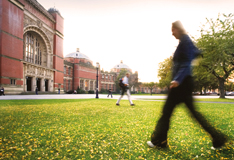
Universities ask schools to consider later start times for teenage pupils
Birmingham, Feb 22 (IBNS): A team of ‘sleep experts’ are leading a study looking at teenagers’ sleep patterns and testing whether a later school start time could benefit them.
Research already suggests that teenagers don’t get enough sleep, with both physical and social reasons for this, including changes in their melatonin, staying up too late - distracted by TV and computers – resulting in problems with their progress and well-being at school.
The ‘sleep experts’ from the Universities of Birmingham, Oxford and Aberdeen will be testing out the later start to the day, to see if the teenager’s school work and well-being could benefit.
The researchers are recruiting secondary schools across the UK to take part in the study.
Professor Paul Montgomery, lead researcher, University of Birmingham said: “We want people to be aware that sleep deprivation in adolescents is a real problem which affects their functioning, their wellbeing and even their academic performance."
“We want to work with schools - with parents, pupils, teachers, head teachers, support staff, local education authorities and civil servants to run a number of studies to find out what the ideal starting time is, and how schools can manage this,” Montgomery said.
The sleep study will focus on GCSE students from years 10 and 11 and the researchers are asking secondary schools to get in touch if they would like to be a part of the programme and to help collaborate on what needs to be done for a later start time to become feasible in practice.
The researchers are urging any secondary schools who have noticed problems in their pupils such as over-tiredness and want to look at ways to support their pupils - by improving their alertness and mental wellbeing - to get in touch via the website.
Support Our Journalism
We cannot do without you.. your contribution supports unbiased journalism
IBNS is not driven by any ism- not wokeism, not racism, not skewed secularism, not hyper right-wing or left liberal ideals, nor by any hardline religious beliefs or hyper nationalism. We want to serve you good old objective news, as they are. We do not judge or preach. We let people decide for themselves. We only try to present factual and well-sourced news.







